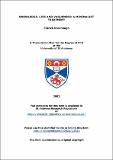Knowledge, lies and vagueness : a minimalist treatment
Abstract
Minimalism concerning truth is the view that that all there is to be said concerning truth is exhausted by a set of basic platitudes. In the first part of this thesis, I apply this methodology to the concept of knowledge. In so doing, I develop a model of inexact knowledge grounded in what I call minimal margin for error principles. From these basic principles, I derive the controversial result that epistemological internalism and internalism with respect to self-knowledge are untenable doctrines. In the second part of this thesis, I develop a minimal theory of vagueness in which a rigorous but neutral definition of vagueness is shown to be possible. Three dimensions of vagueness are distinguished and a proof is given showing how two of these dimensions are equivalent facets of the same phenomenon. From the axioms of this minimal theory one can also show that there must be higher-order vagueness, contrary to what some have argued. In the final part of this thesis, I return to issues concerning the credentials of truth-minimalism. Is truth-minimalism compatible with the possibility of truth-value gaps? Is it right to say that truth-minimalism is crippled by the liar paradox? With respect to the former question, I develop a novel three-valued logical system which is both proof-theoretically and truth-theoretic ally well-motivated and compatible with at least one form of minimalism. With respect to the second question, a new solution to the liar paradox is developed based on the claim that while the liar sentence is meaningful, it is improper to even suppose that this sentence has a truth-status. On that basis, one can block the paradox by restricting the Rule of Assumptions in Gentzen-style presentations of the sentential sequent calculus. The first lesson of the liar paradox is that not all assumptions are for free. The second lesson of the liar is that, contrary to what has been alleged by many, minimalism concerning truth is far better placed than its rival theories to solve the paradox.
Type
Thesis, PhD Doctor of Philosophy
Collections
Items in the St Andrews Research Repository are protected by copyright, with all rights reserved, unless otherwise indicated.

